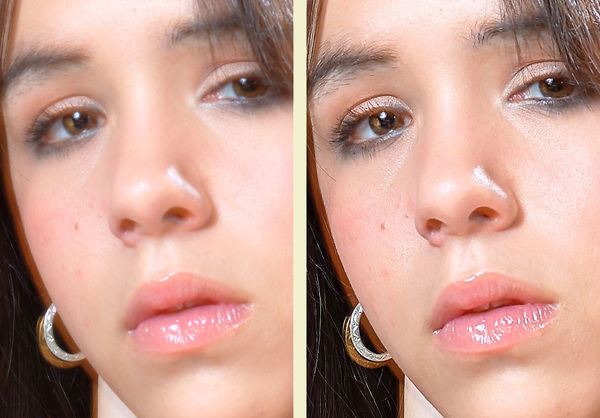Sharpness . . . Lens quality versus software postprocessing
Dec 19, 2017 10:54:08 #
bcrawf wrote:
Not be affected? Well, yes, if he paid up for use of the image(s).
Analyzing an image is not a protected use as far as I am aware.
Dec 19, 2017 10:59:18 #
OptiCole wrote:
I know there is an optical difference between a &q... (show quote)
I am not advocating cheap lenses over premium lenses. I dream that someday I will have nothing but Zeiss or GMaster lenses.
However, I think the OP’s question skirts on a couple of valid questions.
Nearly all modern lenses, including kit lenses, are sharp in the center and at the middle of their aperture range. Most lens reviews seem to concentrate on a couple of performance points – edge to edge sharpness, corners and ‘wide open’ performance. And yet how often do you place your subject at the edge or corner of your frame? I rarely see a portrait or a bird shot or a flower macro here on UHH where edge or corner sharpness would make any difference. Even with landscapes, the corners are usually sky or clouds. The natural eye does not see sharp from corner to corner, in fact the eye really only focuses on a very small area of the field of vision at a time. So why this obsession with corner or edge sharpness? Using a lens ‘wide open’ is usually to achieve short focus field with bokeh background – so why worry about corner sharpness. Also, using a FF lens on a crop sensor camera can cut off the ‘crust’ at the edge of the frame so paying a premium for a top quality lens would appear to be a waste of money for a crop user.
Other typical performance criteria include distortion, aberration and vignetting. Kit lenses usually come with a camera as part of system. The ‘system’ includes lens profiles that usually do a pretty good job of cleaning up any of these shortcomings inherent in the kit lens. If the kit lens is tested without the lens profile it may indeed be poor, but that is not the way it is intended to be used.
There are other criteria like focus speed, waterproofness and robustness that can be important to certain users and justify the premium. For me, I find that my better lenses, or at least the ones I value the most, just have better color rendering, contrast and, for want of a better word, what I call ‘smoothness’. I suppose I get some reassurance (or pride) if the lens has a high edge to edge sharpness rating, but I can’t say that I can tell the difference.
Dec 19, 2017 11:21:29 #
OptiCole wrote:
I know there is an optical difference between a &q... (show quote)
Well, I know a number of direct lens comparisons that show how lens quality still matters a great deal. Digital sharpness is really edge contrast. It isn't lens resolution. There is a HUGE difference. And because there is a lot more to image quality than just sharpness (bokeh, aperture shape, and freedom from flare, vignetting, distortion, chromatic aberrations, etc.), current software can only go so far to simulate a look.
A 42.5mm f/1.7 Panasonic Lumix and a 42.5mm f/1.2 Panasonic Leica lens vary a lot more than about 2/3 of a stop and $1000 in price. The f/1.7 lens is very good... But the f/1.2 Leica design is incredible! You have to use both on the same subject to appreciate the difference. Those who do portraiture, stage and screen photography, street photography, and independent film making (with a Lumix GH5) will often spend the extra $1000 for the Leica design.
Dec 19, 2017 11:22:52 #
dsmeltz wrote:
Analyzing an image is not a protected use as far as I am aware.
I was replying to the claim that an algorithm would apply detail from found online images. While it is a ridiculous notion, the copyright matter would not be.
Dec 19, 2017 11:33:29 #
There's is one more item about marketing related to pros that you've hit on...tax deductible, or most visible shooters like those doing NFL, international sports are given their gear, freebee. I benefited from this never paying a penny for my equipment for over 30 years.
All this is a promotional tax deduction for Nikon, Canon, so it's a winning deal for the 'select'.
All this is a promotional tax deduction for Nikon, Canon, so it's a winning deal for the 'select'.
Dec 19, 2017 11:53:14 #
bcrawf wrote:
I was replying to the claim that an algorithm would apply detail from found online images. While it is a ridiculous notion, the copyright matter would not be.
The program would only analyze similar photos to make a mathematical guess relative to what "should" be in the image to develop an algorithm that would then be applied to the image that was taken. Do you understand that an algorithm is a mathematical formula? No one image analyzed is actually duplicated, printed, used in advertisements or published in any form. Observations from thousands or millions of images is all that would be incorporated in the final image, not the actual images or parts of images.
Dec 19, 2017 12:00:27 #
BigDaddy wrote:
Since before the turn of the century, you have to ... (show quote)
I'n not "stuck" in film, though I still do have my Olympus OM-1. There is nothing wrong with shooting film, and a number of UHH members shoot film.
I disagree with your statement that today you have to be both a photographer and a computer operator. Certainly digital photography requires you to be a computer user to do PP. But I'd rather spend my time outdoors taking pictures than indoors on a computer.
Dec 19, 2017 12:06:44 #
OptiCole wrote:
I know there is an optical difference between a &q... (show quote)
Its still true today, its a night and day difference, (no software can turn a crap lens into a top notch lens)!
Dec 19, 2017 12:12:55 #
A long post. I am weighing in on the Post-Processing side. Software can indeed help a cheap lens rival the effects of an expensive lens.
1. The diffusion issue affecting sharpness has been rendered almost moot with the advent of the Clarity and Dehaze filters. So this would mean that a cheaper lens could be stopped down more to take advantage of its sharper center area.
2. Adobe's Shake Reduction filter although meant for camera movement can restore some sharpness in other instances too.
3. Photoshop techniques involving many steps (which don't involve the Smart Sharpen filter) can also revive a soft shot. The image posted has some of these techniques applied.
1. The diffusion issue affecting sharpness has been rendered almost moot with the advent of the Clarity and Dehaze filters. So this would mean that a cheaper lens could be stopped down more to take advantage of its sharper center area.
2. Adobe's Shake Reduction filter although meant for camera movement can restore some sharpness in other instances too.
3. Photoshop techniques involving many steps (which don't involve the Smart Sharpen filter) can also revive a soft shot. The image posted has some of these techniques applied.
speters wrote:
Its still true today, its a night and day difference, (no software can turn a crap lens into a top notch lens)!
Dec 19, 2017 12:14:34 #
dsmeltz wrote:
A photographic artist, so both.
Do you mean like snapping a shot, replacing the sky, replacing the background, replacing the foreground, turning it in to a collage and calling it a photograph?
Dec 19, 2017 12:15:28 #
speters wrote:
Its still true today, its a night and day difference, (no software can turn a crap lens into a top notch lens)!
Yes, and one would suppose any photography-involved person would realize that lens quality varies from excellent to child's-play-camera (or so) and that somewhere along that range anyone would recognize that the quality of the lens is important.
Dec 19, 2017 12:17:56 #
Incidentally, no halos in the above shot revived in post.
Fotoartist wrote:
A long post. I am weighing in on the Post-Processi... (show quote)
Dec 19, 2017 12:20:32 #
ToBoldlyGo
Loc: London U.K.
I say yes there are differences, but if you are happy with the kit you have then be happy. There is little need to lust over gear you can't afford it you are happy with results you currently get. If you are unhappy then maybe you should look into high end lenses. But you may well get what you want without spending huge amounts. Depends what you're after and what system you are in. Good luck in finding out.
OptiCole wrote:
I know there is an optical difference between a &q... (show quote)
Dec 19, 2017 12:22:47 #
Mac wrote:
Do you mean like snapping a shot, replacing the sky, replacing the background, replacing the foreground, turning it in to a collage and calling it a photograph?
Not for me, but if that is what you are able to do, enjoy it.
Dec 19, 2017 12:29:31 #
Fotoartist wrote:
A long post. I am weighing in on the Post-Processi... (show quote)
Fotoartist's example was pretty fair, but look at these to see what post-processing can do:


If you want to reply, then register here. Registration is free and your account is created instantly, so you can post right away.






